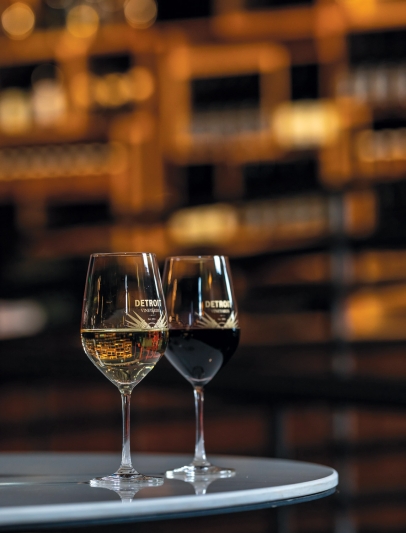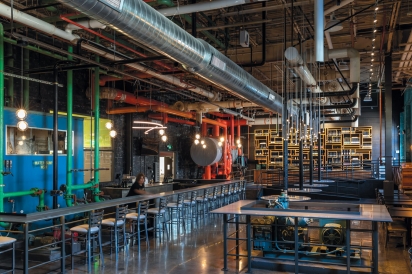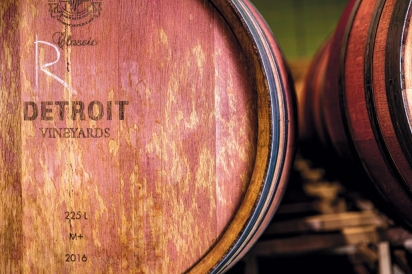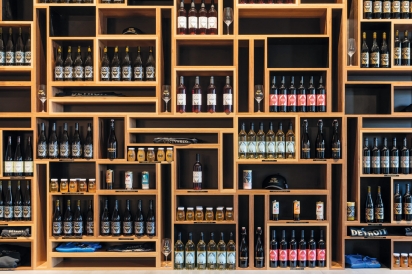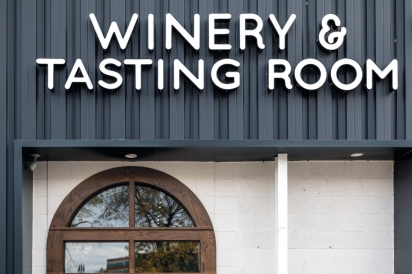Detroit Vineyards
Think “winery” and you might imagine the rolling hills of the California Central Coast or a palatial French château. You probably wouldn’t expect a fully functioning winery right outside of downtown Detroit. At Detroit Vineyards, Detroit’s first winery in 60 years, traditional winemaking meets urban repurposing.
Established in 2014 and operating as a micro-winery, the vineyard has since expanded, moving into the former Stroh’s Ice Cream factory in the historic Eastern Market district in 2018. This massive new space houses the production facility where they make wine, mead and cider as well as a new tasting room built to use and highlight the original factory infrastructure.
“We’re trying to renovate these old buildings instead of knocking them down,” says Christopher Southern, general manager at Detroit Vineyards. “We left all the functioning pipes, all the duct work, and we used some of the duffers to float the tables. It’s very ‘Detroit post-industrial.’”
Detroit Vineyards is joining a small yet potent movement of urban wineries around the United States. By choosing to locate production within cities rather than the classic rural setting, urban wineries allow more people access to the winemaking process.
Much of the urban winery landscape is concentrated in California and the Pacific Northwest. Southern, a Michigan native who has spent the last decade making wine from New Zealand to Napa, believes in the efficacy of winemaking in his home state.
“It’s colder here, there’s not as much sunshine, so we’re just better at making varietals you would see in places like the Rhine in Germany, Alto Adige in Italy and Bordeaux in France,” Southern says.
Due to these lower temperatures, Michigan grapes will produce lower alcohol, higher acidity wines than in regions like California. Southern explains that Detroit Vineyards excels at wines such as Riesling, Pinot Noir, Cabernet Franc and Chardonnay—all made with fruit sourced from Lake Michigan Shore AVA, an American Viticultural Area in southwest Michigan’s fruit belt.
“The winemaking process is the same and we can make good wine here, we just can’t make as many kinds. We still have quite a few varieties,” Southern says.
Moving forward, Southern hopes to consolidate the number of wines that Detroit Vineyards produces as well as explore other varietals.
“I want to start building relationships with growers in the state so that we can get our hands on things we really want to make,” Southern says. “I’d love to make Gamay. I’d love to make Kerner. I think we can also build our cider program a little bit.”
With the opening of its 3,000-square-foot tasting room in May, Detroit Vineyards is focusing on sharing the quality of its Michigan wines and brews with the Detroit community.
Tasting Room Manager Chalan Lind moved to Detroit from Paso Robles, California, in January to facilitate the opening. The transition from California wine country to downtown Detroit has been a learning experience.
“In wine country you’re surrounded by guests who have an understanding of wine tasting and what the experience is like,” Lind says. “I don’t know how many people in downtown Detroit are necessarily familiar with wine tasting, so we’re trying to incorporate education about the tasting experience and Michigan wines.”
The winery offers educational tours every Saturday, with an educated wine guide leading visitors around the production facility and the barrel room.
“Not only do guests get familiar with the space and history of Detroit Vineyards, but they also get an education about our winemaking process—where we source our fruit, where we source our oak [barrels] and how we go about making wines in the city of Detroit,” Lind says.
In addition to educational tours, Detroit Vineyards also offers a weekly ballroom dance as well as a “Lyrics and Libations” free-style poetry event. Southern hopes to feature local musicians and live music in the future.
This dedication to educating and being part of the Detroit community doesn’t stop with the tasting room. While most of the fruit used in production comes from Lake Michigan Shore, Detroit Vineyards currently has one vineyard planted in Detroit’s MorningSide community, with plans to plant more around the city in blighted vacant lots.
“It’s not only that we’ll eventually see fruit that we’ll use,” Lind says. “It’s also aesthetically appealing for the community.”
The vineyard in MorningSide is in partnership with the nonprofit U-Snap-Bac, which promotes economic growth and neighborhood improvement in Detroit’s Eastside. All fruit proceeds bought back from the vineyard go to U-Snap-Bac.
This partnership is indicative of what Southern hopes Detroit Vineyards will have in Detroit.
“We’re not curing cancer, we’re not reinventing the wheel. We just want to be a good business that does what we say we’re going to do in Detroit,” Southern says. “We’re committed to being part of the city, being a steward of whatever land that we occupy here and employing people that live in the city.”
For Southern, a large part of coming back to Michigan to run Detroit Vineyards is about contributing to the growing food and beverage scene and providing an experience that Detroiters wouldn’t be able to get anywhere else.
“This is a manufacturing town and it’s part of our culture here,” Southern says. “We make cars, we make bikes, we make watches. We have great chefs, great food, great beer. We should have a winery, too.”
Detroit Vineyards: 1000 Gratiot Ave., Detroit, 313-784-9726, DetroitVineyards.com


